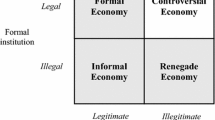Abstract
This paper is a critical evaluation of Hayek's “Atavism of social justice” thesis, suggesting an alternative explanation of the widespread demands for social justice in contemporary society. It is based on the analysis of the nature of entrepreneurship and its tendency to incite envy. The advantages of the proposed explanation include a better understanding of the persistent hostility against commerce and the market system and the possibility of a systematic exploration of the factors which make the demand for social justice stronger or weaker.
Similar content being viewed by others
References
Akerlof, G.A. (1970) “The Market for ‘Lemons’.”Quarterly Journal of Economics 84: 488–500.
Bryce, J. (1959)The American Common Wealth. Vol. 2. New York: Macmillan.
Buchanan, J.M. (1979)What Should Economists Do? Indianapolis: Liberty Press.
Choi, Y.B. (1993)Paradigms and Conventions. Ann Arbor: University of Michigan Press.
Fuller, L.L. (1968)Anatomy of the Law. New York: New American Library.
Hayek, F.A. (1963)The Sensory Order. Chicago: University of Chicago Press.
Hayek, F.A. (1973)Law, Legislation, and Liberty: Rules and Order. Vol. 1. Chicago: University of Chicago Press.
Hayek, F.A. (1976)Law, Legislation, and Liberty: The Mirage of Social Justice. Vol. 2. Chicago: University of Chicago Press.
Hayek, F.A. (1979)Law, Legislation, and Liberty: The Political Order of a Free People. Vol. 3. Chicago: University of Chicago Press.
Hayek, F.A. (1978)New Studies. Chicago: University of Chicago Press.
Hayek, F.A. (1989)The Fatal Conceit. Edited by W.W. Bartley, III. Chicago: University of Chicago Press.
Heiner, R. (1983) “The Origin of Predictable Behavior.”American Economic Review 73: 560–595.
Heiner, R. (1990) “Rule Governed Behavior in Evolution and Human Society.”Constitutional Political Economy 1: 19–46.
Hughes, J. (1991)Governmental Habit Redux. Princeton: Princeton University Press.
Isaac, R.M.; Mathieu, D.R.; and Zajac, E.E. (1991) “Institutional Framing and Perception of Fairness.”Constitutional Political Economy 2: 329–370.
Kirzner, I.M. (1973)Competition and Entrepreneurship. Chicago: University of Chicago Press.
Kirzner, I.M. (1979)Perception, Opportunity, and Profit. Chicago: University of Chicago Press.
Knight, F.H. (1935)Ethics of Competition. London: Allen Unwin.
Montaigne, M. de (1979)Essays. Transl. by J.M. Cohen. New York: Penguin Books.
Rawls, J. (1971)A Theory of Justice. Cambridge: Harvard University Press.
Schoeck, H. (1987)Envy. Indianapolis: Liberty Press.
Schumpeter, J.A. (1989)The Theory of Economic Development. New Brunswick, NJ: Transaction Publishers.
Stigler, G.L. (1976) “Xistence of X-Efficiency.”American Economic Review 66: 213–216.
Author information
Authors and Affiliations
Additional information
An earlier draft was presented at the Friedrich August von Hayek Memorial Symposium, Bleibach, Germany, June 9–12, 1993. I thank the participants of the symposium for their helpful comments and suggestions.
Rights and permissions
About this article
Cite this article
Choi, Y.B. Entrepreneurship and envy. Constit Polit Econ 4, 331–347 (1993). https://doi.org/10.1007/BF02393267
Issue Date:
DOI: https://doi.org/10.1007/BF02393267




